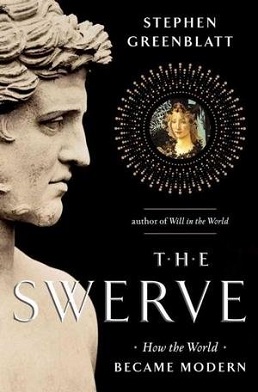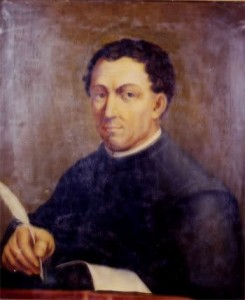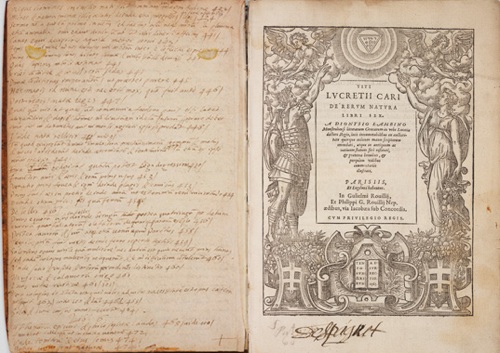Book Report on The Swerve
The Swerve

Introduction:
The Swerve: How the World Became Modern is a non-fiction novel about the adventures that a book hunter endures to find a lost poem that changes the course of the way in which society thinks about the world we live in. The book hunter in the novel is named Poggio Bracciolini who is after the Roman philosopher, Lucretus's poem. The novel begins in the 1400's and continues throughout the fourteenth and fifteenth century alternating between Poggio's quest to find Lucretius's poem and an analysis by Greenblatt of the different societal conflicts at the time.
Chapter 4: The Teeth of Time
Chapter four was one of my favorite chapters. This was a more light hearted and quite honestly humorous chapter of the book. Greenblatt uses dense language that at times can be a bit overwhelming. However, in this chapter Greenblatt discusses the reason in which I chose this book and that is books themselves. This chapter evokes the importance of scribes and library throughout the years. Books were manuscripts and the preservation of these manuscripts was rarely upheld. Books used to be valued, traded and even wealth was noted in vast book collections. This quickly shifted throughout history into books sadly being put on the back burner for religious affinity. This chapter plays off of the title of the chapter describing how the papers were subjected to bugs that ate the paper making parts of the manuscript up to interpretation, ie. the rise of book worms. Other than the thorough description of Roman libraries and buried works Greenblatt delves into a rising issue between society.
During this time christianity was the main governing religion. Poggio, a humanist, has a vastly diverse background involving law, philosophy and being a secretary to various Pope's. Greenblatt describes the tension between and within the Christian community and its' feelings towards revolting pagans. Greenblatt goes into detail about how there was a time where the world was just curious. Trying to seek the truth. There was a women named Hypatia who was a natural leader and spoke her reasoning on ending tensions between all designations within society. Her refusal to get rid of the jewish part of the community led to her death by a Christian mob. Greenblatt uses her as a symbol for the fall of intellectual standards and peace. She was good and honest. Throughout the book Greenblatt explains that philosophers explain these horrific acts as ignorance and fear induced. As a whole this chapter is a push and pull of moral conscious, as is the book itself. The chapter calls out the moral hypocrisy within Christianity, much of which is seen throughout Poggio's existence.
Chapter 6 builds upon the themes from chapter four. Greenblatt plays through the title again of "the lie factory" focusing this chapter on Poggio's struggles throughout his time in Papal courts. Poggio is a gifted scribe, throughout the book being praised as having one of the best handwriting to be seen thus far. His time in court with Cardinal Bari was definitely a learning experience. Poggio found himself being two sided. There was the hardworking man who had the ear of very powerful Christian leaders, yet he too found if he succumbed to their ways he would be everything he worked hard to avoid. The court was filled with other scribes, as well as people in power who outside of court bad mouthed and criticized their own beliefs. While later in the book the it is explained that pain is a way to be closer to God and to avoid pleasure, many of these men slandered their teachings and wrote of their leisure activities. Especially, those higher up that Poggio witnessed.
Poggio wrote his own works based off of his time in the courts. One of which being called "Facetiae" where he exploits all of the misinformation of the "Christian" ways. He feels trapped most of the chapter with his only escape from the world he struggled to live in being reading. He states "I am free for reading" this being his outlet from the business that was the Papal courts. This part is relatable in current day given the Covid-19 outbreak. I find my favorite times are when I can sit with a book and forget all of the political nonsense that is wildly over discussed in the media.
Chapter 8: The Way Things Are
It is in chapter eight that we finally get a full explanation as to why Lucretius's poem was so vital in changing the course of the modern world. Poggio has already found the poem, which is titled, "On the Nature of Things". Greenblatt uses this chapter to take a step away from Poggio's adventure in order to explain what it was that made Lucretius's poem that important to be continued through Poggio's scripts. If Poggio had not discovered this work the foundations of philosophy and psychology that we know today would not be as they are. He set the scene for well known philosophers to further his ideas, which at the time were seen as ridiculous and crude.
"On the Nature of Things" was a very long piece. Greenblatt did not even cover half of the ideas in which Lucretius brings up. Some of the most important ones that were outrageous for the time were as follows,
-"everything is made out of invisible particles"
-"the universe has no creator or designer"
-"everything comes into being as a result of a swerve (a change)"
-"All organized religions are superstitious delusions"
These are to only name a few. At the time when society was ruled by religion to have these things said was blasphemous. While much of what he said we now have proof to back, such as atoms being the building blocks to everything we are, other things were disproved or slightly different. He had some parts correct, parts in which how the world was created we now know to be the big bang. Lucretius brings ideas that if not for scribes transcribing works throughout history we would not have the evolved society that we have today. There are many lessons to be taken from this novel. However, there is much to be debated and scrutinized. Greenblatt does a great job in making this journey more easy to grasp. Society still has many issues, but the groundwork that was set made it so the progress we made to becoming an intelligent society was not to be diminished.
Conclusion:
This book touches on such a wide variety of historical and present day issues. While it is a hefty read, I feel like I could reread it twenty times and still find something to gain from it. I have never been a fan of history, but Greenblatt turned history into a captivating journey that I was fully intrigued with. My love for books was heightened and embodied in this work and I felt like I was as a part of keeping this history alive as Poggio was. I did not think I would have enjoyed this book as much as I did. I would highly recommend giving this book a chance despite the intimidating use of, at times, excessively large words.


Comments
Post a Comment